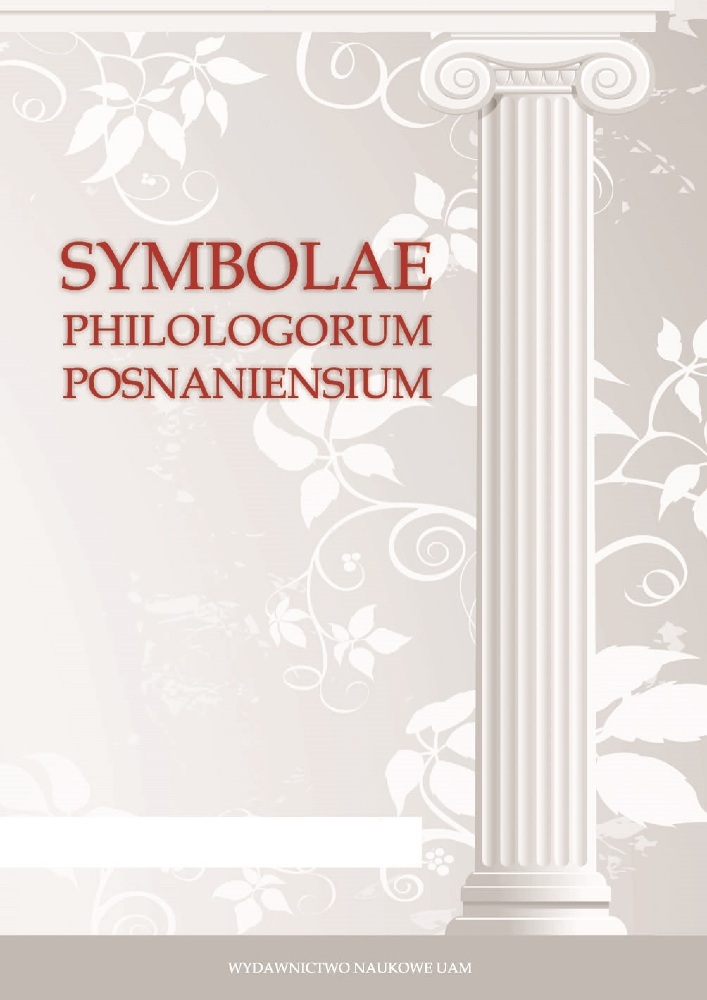Abstrakt
Sophocles’ second Oedipus-play clearly relates to the first; it holds, however, a particular place in literary history, for it was the last play to be included into the canon of classical Attic tragedy. Moreover, the play shows another peculiarity: though the idea that death can be preferable to life is familiar to all Sophoclean protagonists, Oedipus was the only one allowed to get old, a process depicted quite realistically by old Sophocles. Oedipus’ self-explanation, however, that he suffered himself more than he really acted, resembles much a Catch-22 situation: if that were the case in those days, as Oedipus says that it was, he then was crazy and didn’t have to do what he did; but if he didn’t want to do what he did then, he was sane and had to do it, because the gods wanted him to do it. The proposed new reading of the play shows how time and age work on Oedipus’ frame of mind: a desire for whitewashing is acted out in a blame-game, awareness of what is to come is coupled with rather a hesitant manner as though he is slightly unsure of himself (what he is not), and eventually, being out of touch with time and fearing to be left alone make Oedipus curse, for he had been treated unjustly: Oedipus comes close to Shakespeare’s King Lear, though he does not go mad, he only becomes bad and dangerous to know.Bibliografia
Billeter 1911: G. Billeter, Die Anschauungen vom Wesen des Griechentums, Leipzig–Berlin 1911.
Blundell 1989: M.W. Blundell, Helping Friends and Harming Enemies: A S tudy in Sophocles and Greek ethics, Cambridge 1989.
Butcher 1893: S.H. Butcher, Some Aspects of the Greek Genius, London (second edition) 1893.
Fraenkel 1950: E. Fraenkel, Aeschylus: Agamemnon, Oxford 1950.
Gould 2001: J. Gould, Give and Take in Herodotus, in: J.G., Myth, Ritual, Memory, and Exchange: Essays in Greek Literature and Culture, Oxford (first published Oxford 1991 as a Myres Memorial Lecture) 2001.
Handke 2003: P. Handke, Sophokles: Ödipus in Kolonos, Frankfurt am M. 2003.
Instone 2007: S.J. Instone, ‘Darkness, my Light’: Enigmatic Ajax, in: Hesperos: Studies in Ancient Greek Poetry presented to M.L. West, Oxford 2007, 228–238.
Jebb 1900: R.C. Jebb, Sophocles: The Oedipus Coloneus, Cambridge (third edition) 1900.
Kelly 2009: A. Kelly, Sophocles: Oedipus at Colonus, London 2009.
Knox 1964: B.M.W. Knox, The Heroic Temper: Studies in Sophoclean Tragedy, Berkeley 1964.
Lloyd-Jones, Wilson 1990: H. Lloyd-Jones, N.G. Wilson, Sophoclea: Studies on the text of Sophocles, Oxford 1990.
Marx 2012: W. Marx, Le tombeau d’OEdipe: Pour une tragédie sans tragique, Paris 2012.
Page 1981: D.L. Page, Further Greek Epigrams, Cambridge 1981.
Reinhardt 1971: K. Reinhardt, Sophocle, Paris (first published in 1933) 1971.
Seidensticker 1972: B. Seidensticker, Beziehungen zwischen den beiden Oidipusdramen des Sophokles, “Hermes” 100 (1972), 255–274.
Seidensticker 2005: B. Seidensticker, Über das Vergnügen an tragischen Gegenständen, München–Leipzig 2005.
Wilamowitz-Moellendorff 1917: Tycho von Wilamowitz-Moellendorff, Die dramatische Technik des Sophokles, Berlin 1917.
Winnington-Ingram 1980: R.P. Winnington-Ingram, Sophocles: An Interpretation, Cambridge 1980.
Licencja
